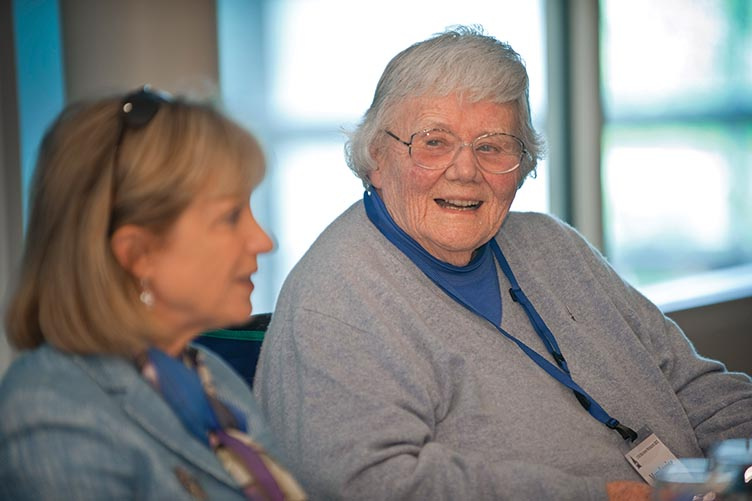
A friend to every Democratic presidential candidate since Jimmy Carter, Mary Louise Hancock once spent the night in the Lincoln Bedroom with first daughter Amy Carter’s cat curled at her feet. At home in Concord, the state’s “grand dame” of politics welcomed candidates seeking her astute observations about what the people of New Hampshire expected from their elected officials.
Mary Louise’s interest in government began in childhood, when she was captivated by informal political discussions she overheard in her father’s drugstore, located across the street from the State House. After college, Mary Louise became a research librarian and later joined the state planning office, where she worked for 32 years. She became the first female state planning director in the country, a position she held until she was elected to the state Senate in 1975, the first woman and first Democrat to represent the Concord district. When her term expired, she worked for the U.S. Department of Housing and Urban Development until 1981.
She was a role model for many women considering a life in politics, including Anne Schweitzer of St. Louis, Missouri. Interested in working on Hillary Clinton’s presidential campaign, Anne contacted Mary Louise after reading a newspaper article about her influence on New Hampshire politics. A longtime friend of both Bill and Hillary Clinton, Mary Louise helped Anne secure an internship in Hillary’s New Hampshire campaign and housed her and her cats for six months. Well into her 90s by then, Mary Louise waited up for Anne every evening to discuss the campaign’s progress.
“She was incredibly curious about people.”
Mary Louise never married and had no children of her own but enjoyed deep and enduring friendships that spanned both years and generations. One of those friendships was with Deborah Butler, with whom she ate dinner every Sunday night for three decades. “Many things made Mary Louise special,” says Deborah, noting that whether she was speaking with a visiting politician, the mailman or someone dropping off her dry cleaning, Mary Louise could easily engage in an hour-long conversation. “She was incredibly curious about people.” Although best known for her political influence, Mary Louise had eclectic interests and a dry sense of humor. An Anglophile, she was fascinated by a recent television series about the British royal family. She found the program generally well-researched, but Deborah says her keen powers of observation were still in evidence at age 97. She delighted in pointing out small inaccuracies, such as the fact that the actress portraying Queen Elizabeth II was not sufficiently buxom.
Mary Louise also enjoyed a competitive game of cards and a good glass of Scotch. An English major at UNH, she loved poetry and literature and regaled visitors with pithy quotes from Shakespeare and other favorite writers. An advocate for education, she devoted years of service to the Concord School Board and was active on many other boards and committees. Among many other honors, she received the Distinguished Service Award from the American Institute of Planners and both the Granite State Award for Outstanding Public Service and the Meritorious Service Award from UNH.
Before she died on Dec. 4, 2017, following a period of declining health, Mary Louise asked Deborah’s son Benjamin Savard to speak at her funeral. In his eulogy, Benjamin noted that while he admired Mary Louise the political doyenne, it was as a family friend that she touched him most deeply. Diagnosed with Type 1 diabetes at age 16, and fearing what life with a chronic illness would be like, Savard tentatively brought up the childhood bout with polio that had left Mary Louise with limited use of one leg. “She waved the question away and with three sentences changed my life,” he told the funeral gathering.
“Talk like that will only get you in trouble,” she told him. “It’ll sully the opportunities you’ve been given. Life is far more precious than we pretend.”
Originally published in UNH Magazine Spring 2018 Issue
-
Written By:
Karen Tongue Hammond '64 | UNH Magazine
















































